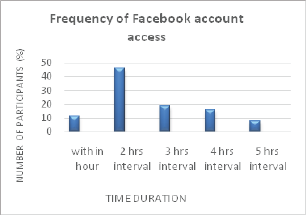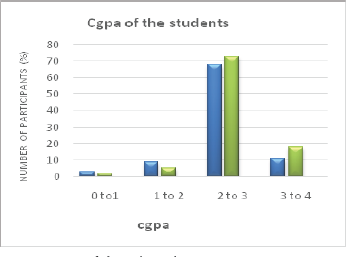Impact Factor : 0.548
- NLM ID: 101723284
- OCoLC: 999826537
- LCCN: 2017202541
*Nida Tabassum Khan
Received: March 12, 2018; Published: April 11, 2018
*Corresponding author: Nida Tabassum Khan, Department of Biotechnology, Faculty of Life Sciences and Informatics, Baluchistan University of Information Technology Engineering and Management Sciences,(BUITEMS), Quetta, Pakistan
DOI: 10.26717/BJSTR.2018.03.000950
Social network sites such as face book provides an online user friendly facility to the people to share their personal or professional profiles by connecting with other users with whom they share a common interest. Facebook addiction interfered with addicts' academic/ professional performance and their social lives as a large number of students spend most of their time on Facebook which affects the academic execution of those students. The study revealed high (51 %) prevalence of face book addiction among undergraduates at BUITEMS and also a strong correlation was determined between face book addiction and academic performance of student.
Keywords: Bergen Face Book Addiction Scale; Facebook Addiction; Social Capital; Psychological Disorder
Social network sites such as Facebook provides an online user friendly facility to the people to share their personal or professional profiles by connecting with other users with whom they share a common interest [1]. Facebook enabled different communities/ groups of people to stay connected [2] by instantly messaging and navigating [3]. Social networks in specific face book have provided ways for social engagement as a potent tool for depicting an individual's personality through his/her public profile [4]. A study revealed that 82% of young adults and 55% adolescents were regular Facebook users [5]. As it is obvious with an increased and free access to these social sites, there will be an elevated number of people who engage in such activities on daily basis [6]. Purpose of Facebook use varies from person to person which mostly includes entertainment, maintaining relationships, meeting new people, social events and media creation [7,8]. Among mounting explosion of social network sites probability of social network addiction is also very common and is now being characterized as a psychological disorder worldwide [9]. Increasing plea of social networks could potentially be a cause for concern, especially taken in account the amount of time spends online by the young adults and adolescents [10]. From a psychological standpoint, it may be probable that Facebook addiction of a person's is influenced by his or her personal life issues such as negligence in personal life, mental preoccupation, mood modifying experiences, tolerance etc as these issues were prominent in some people who were identified as Facebook addicts [11,12]. Evidences from previous researches have shown that Facebook addiction interfered with addicts’ academic/ professional performance and their social lives [13]. A large number of students spend most of their time on Facebook [14]. According to a research it revealed that the time deployed on Facebook did influence the academic execution of those students [15]. Therefore the main purpose of this study was to determine the prevalence of face book addiction and also to analyze the factors influencing an individual’s face book addiction. Relationship between face book addiction and academic performance of student was also evaluated during this study.
A total of 100 undergraduate students were selected from different department at BUITEMS. To fall within the selection criteria, every respondent must be a regular Facebook user. This analytical study was conducted using the BFAS scale (Bergen face book addiction scale) (Andreassen et al., 2012) [16]. Demographic information (age, gender etc) and academic information (CGPA and current semester) and time spent on Facebook (minutes per day) was also considered.
a) 0 to 19: Low
b) 20 - 49: Moderate
c) 50 - 79: High -possible Facebook
d) 80 - 100: Extremely high -Facebook addict
e) Statistical analysis of the data was done by means of Microsoft excel
Out of 100 participants, 59% were females and 41% were males as depicted in (Figures 1 & 2). Represents the face book addiction factors in both the genders. Frequency of Facebook account access everyday by University Undergraduates is given in (Figures 3 & 4). Reveals the current cgpa of the selected participants Incidence of face book addiction is given in (Figure 5).
Figure 1: Sex distribution.

Figure 2: Prevalence of face book addiction factors.

Figure 3: Frequency of Facebook account access.

Figure 4: Cgpa of the selected participants.

Figure 5: Level of face book addiction.

This study revealed that undergraduates were active Facebook users. Availability of internet on phones, laptops, tablets etc has greatly increased the access of students to face book [16,17]. As further revealed by the findings of this study, 46% of the subjects of this study access their Facebook account every passing two hour of their wakening moment, 19% do so at least three hour interval while 16.0% do so at least three hour interval as indicated in Figure 3. Further analysis showed that only 51 % were high addiction users, 14 % were moderate users and 29% were possible face book addicts as given in Figure 5. It is a known fact that technological advancements comes with its negative side, most especially when misused or abused [18]. Increased level of international connectivity and social interaction leads to addiction as our obtained result revealed that both sexes have the same likelihood of succumbing to the abusive or addictive use of Facebook [19].
Majority of students at BUITEMS are from financially stable backgrounds where internet access and facilities are not an issue. Therefore at BUITEMS, undergraduates Facebook addiction is prevalent as indicated by the conducted study. Therefore there is a need to consider this social network addiction as a serious disorder and measures should be devising to minimize Facebook use. This research also measured the effect of Facebook addiction on the academic performance. BFAS results revealed that extraversion was found to be highly significant among undergraduates as indicated in Figure 2 suggesting that people who are extroverts and outgoing spend a lot of time using and thinking about Facebook [20]. Furthermore, our results depicted a positive relationship between face book addiction and both neuroticism and openness to experience. It is quite true that users who are not emotionally stable tend to be more engaged in such activities in order to get rid of their problems [21].
Students who invest more time on Facebook spend less time finishing scholarly work as indicated in our study that high Facebook users usually obtained low cgpa in their semester exams as Facebook is not widely used for learning purposes [22]. Constrains of this study were that exact measurement of Facebook utilization should be taken, sample size was limited which may have resulted in the inability to collect a large pool of people with varying personalities. Based on this study it is important to characterize this addiction as a serious disorder and counseling or other ways should be devised to minimize Facebook use.
Biomedical Journal of
Scientific & Technical Research (BJSTR)
indicated in Figure 2 suggesting that people who are extroverts and outgoing spend a lot of time using and thinking about Facebook [20]. Furthermore, our results depicted a positive relationship between face book addiction and both neuroticism and openness to experience. It is quite true that users who are not emotionally stable tend to be more engaged in such activities in order to get rid of their problems [21].
Students who invest more time on Facebook spend less time finishing scholarly work as indicated in our study that high Facebook users usually obtained low cgpa in their semester exams as Facebook is not widely used for learning purposes [22]. Constrains of this study were that exact measurement of Facebook utilization should be taken, sample size was limited which may have resulted in the inability to collect a large pool of people with varying personalities. Based on this study it is important to characterize this addiction as a serious disorder and counseling or other ways should be devised to minimize Facebook use.
Since the number of Facebook users is escalating in which a greater proportion is of students and undergraduates. Thus there is an elevated probability for those users to become Facebook addicts. Therefore there is a growing concern about such users obtaining low cgpa due to excessive Facebook use.


